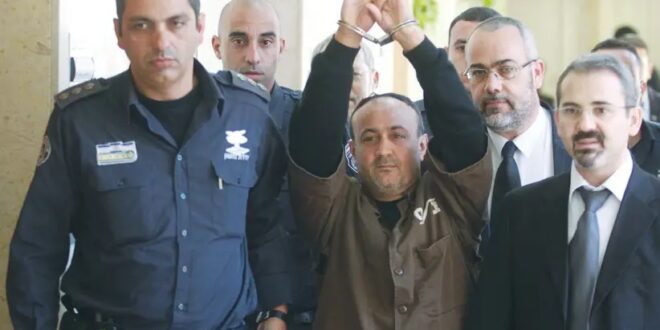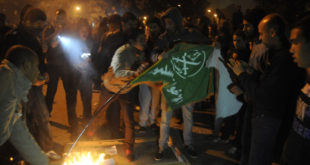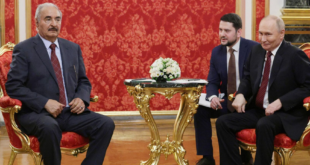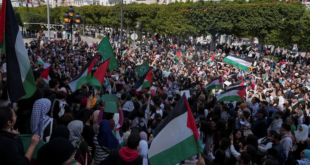As Egypt’s international stature rises for brokering Gaza truce, Hamas gains in popularity on the Palestinian street, but PA ‘still controls the course of affairs,’ analyst says.
Abbas Kamel, the director of Egypt’s General Intelligence Service, met with Prime Minister Benjamin Netanyahu in Jerusalem on Sunday amid Cairo’s efforts to solidify the Hamas-Israel truce it brokered 10 days ago.
From there, Kamel headed north to Ramallah for talks with Palestinian Authority President Mahmoud Abbas and senior PA officials.
Palestinian sources in Ramallah who were in the meeting told The Media Line on condition of anonymity that Kamel was working to expand the scope of his negotiations with Hamas officials to include a “mega deal” that involved the return of the bodies of Israeli soldiers and of Israelis held by Hamas.
“The Egyptians are insisting on an all-encompassing deal that includes the reconstruction of Gaza, for the return of Israelis held by Hamas,” said the source.
Hamas in the past has said any prisoner exchange must include Palestinian leader Marwan Barghouti.
Barghouti, an influential Fatah leader, is serving five life sentences plus 40 years in an Israeli prison, after being convicted of responsibility for the killings of four Israelis and a Greek Orthodox priest during the Second Intifada, or Palestinian uprising, of 2000-2005.
Barghouti’s wife, Fadwa, on Sunday posted a picture of her husband with the caption, “I’ll see you soon,” fueling speculation that a deal is imminent.
After the latest round of fighting between Israel and Hamas/Islamic Jihad, Egypt’s success in securing a cease-fire on May 21 has propelled it into the diplomatic spotlight, prompting top-level communication from Washington, something President Abdel-Fattah el-Sisi was hoping for.
The 11 days of deadly exchange of fire has re-focused the world’s attention on the Israeli-Palestinian conflict. The non-stop Israeli bombardment of the Gaza Strip, and the thousands of Hamas rockets raining down on Israel, forced the US administration to shift its priorities and place the Israeli-Palestinian conflict at the top of its agenda.
The newfound diplomatic energy sent Israeli Foreign Minister Gabi Ashkenazi to Cairo on Sunday − the first official visit of an Israeli foreign minister in 13 years − to discuss with his Egyptian counterpart, Sameh Shoukry, the establishment of a “permanent cease-fire” between Israel and Gaza’s Hamas rulers.
Egypt and the US administration are trying to include PA officials in all the meetings between Cairo and Hamas officials, and President Joe Biden has dispatched Secretary of State Antony Blinken to the region to try to contain the conflict.
In addition, Biden hopes the efforts will lead to a lasting peace.
“We still need a two-state solution; it’s the only answer,” the US president said after the cease-fire was reached.
Ziad Abu Zayyad, a former Palestinian official, told The Media Line the United States had been consulting with Netanyahu, “giving him enough time to continue with his plan to destroy Gaza, and my evidence is that the US delayed the convening of the UNSC [United Nations Security Council] to take any decision by it to call for a cease-fire in Gaza.”
As part of efforts to ease the tensions and boost the fragile cease-fire, Washington has renewed its financial commitments to the Palestinians, promising hundreds of millions of dollars in aid.
“The issue is not reconstructing Gaza, and it’s not giving aid to Gaza, the issue is how to put an end to the vicious cycle of violence and counter-violence. We have seen this movie before in 2007, 2008, 2012, 2014 and 2021, and we may see another round very soon,” Abu Zayyad said.
Some estimates put the Gaza rebuilding price tag in the billions of dollars, while tens of thousands of Palestinians have been made homeless, adding to the existing misery and dire humanitarian situation.
Eli Nesan, an Israeli political analyst and expert on the Israeli-Palestinian conflict, told The Media Line that Egypt has an important part to play, including in stabilizing the truce.
“Several issues are on the negotiating table: a long-term truce, the reconstruction of the Gaza Strip, for Egypt to play a greater role in preventing the smuggling of weapons into the Strip from Sinai,” he said.
Nesan said funds donated for the rebuilding of the impoverished Gaza Strip should not go through Hamas, but rather through the PA and the organizations responsible for rebuilding.
“Israel will not allow it [Hamas control of the money]. These funds are for the benefit of the residents of Gaza, and they must be prevented from falling into the hands of Hamas,” he said.
All these matters, Nissan said, are dependent on the return of the bodies of the two slain soldiers and the two Israeli civilians who are in Hamas custody.
The latest violent escalation increased Hamas’ popularity among many Palestinians. Abu Zayyad told The Media Line the fighting weakened both Netanyahu and Abbas, and emboldened the Islamist movement.
“I think the resistance promised to keep watching what is going on in Jerusalem and protecting Jerusalem. If Israel continues its daily storming of Al-Aqsa Mosque and the evacuation of Palestinians from the Sheikh Jarrah neighborhood and Silwan [both in Jerusalem], then we may expect another act from the resistance, because they are publicly and rightfully and firmly committed to preventing Israel from doing that.”
Abu Zayyad wrote in his weekly column in Al-Quds newspaper, published in east Jerusalem, that Hamas’ popularity has spiked following the latest flare-up with Israel, and it was able to garner international attention and sympathy.
“Hamas has firmly succeeded in placing Jerusalem at the top of the agenda of the region and the agenda of everyone concerned with the stability and security of the region, and the brutality of the war on Gaza and its targeting of civilians and civilian facilities has brought the whole issue back to the top priority of official countries and the international community,” he said.
Abu Zayyad added that the PA’s image among Palestinians was badly shaken. “The official Palestinian leadership in Ramallah has failed to keep pace with the events or be a part of them, and it has left the arena for Hamas alone to capture the emotions of the masses.”
Nesan said, “Hamas was somewhat strengthened at the expense of the Palestinian Authority, but it is still the Palestinian Authority that controls the course of affairs and communications with the Biden administration.”
There were signs that other countries were close to being drawn into the violence: Three times rockets were fired from southern Lebanon into Israel; Israel downed an unidentified drone near the borders with Jordan and Syria; and an infiltration attempt was foiled with the arrest of two Jordanians who crossed into the Jordan Valley.
Nesan said the White House played a crucial role in defusing the tension and bringing an end to violence.
“The American role was very important. Biden had not spoken to Sisi since he [Biden] took office, but the matter changed and he quickly contacted him after things exploded,” the analyst said.
The flare-up was the result of increased tensions in Jerusalem, including over Israeli security forces cracking down on Palestinians on the Al-Aqsa Mosque compound, Islam’s third holiest site, which is also revered by Jews and Christians as the Temple Mount.
The Egyptian president has pledged $500 million for reconstruction efforts in the Gaza Strip.
Israeli strikes on the enclave killed 248 Palestinians, including 66 children, the Gaza Health Ministry says.
Rockets and other fire from Gaza claimed 13 lives in Israel, including one child and an Arab Israeli teenager, medics say.
 Eurasia Press & News
Eurasia Press & News




